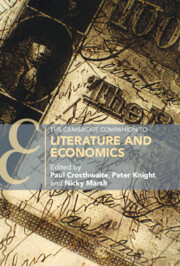Book contents
- The Cambridge Companion to Literature and Economics
- The Cambridge Companion to Literature and Economics
- Copyright page
- Contents
- Contributors
- Introduction
- Part I Histories and Critical Traditions
- Chapter 1 Medieval Literature’s Economic Imagination
- Chapter 2 Early Modern Literature and Monetary Debate
- Chapter 3 Literary and Economic Exchanges in the Long Eighteenth Century
- Chapter 4 Economic Literature and Economic Thought in the Nineteenth Century
- Chapter 5 Women, Money, and Modernism
- Chapter 6 Economic Logics and Postmodern Forms
- Chapter 7 Writing Postcolonial Capitalism
- Part II Contemporary Critical Perspectives
- Part III Interdisciplinary Exchanges
- Further Reading
- Index
- Cambridge Companions To …
Chapter 4 - Economic Literature and Economic Thought in the Nineteenth Century
from Part I - Histories and Critical Traditions
Published online by Cambridge University Press: 28 July 2022
- The Cambridge Companion to Literature and Economics
- The Cambridge Companion to Literature and Economics
- Copyright page
- Contents
- Contributors
- Introduction
- Part I Histories and Critical Traditions
- Chapter 1 Medieval Literature’s Economic Imagination
- Chapter 2 Early Modern Literature and Monetary Debate
- Chapter 3 Literary and Economic Exchanges in the Long Eighteenth Century
- Chapter 4 Economic Literature and Economic Thought in the Nineteenth Century
- Chapter 5 Women, Money, and Modernism
- Chapter 6 Economic Logics and Postmodern Forms
- Chapter 7 Writing Postcolonial Capitalism
- Part II Contemporary Critical Perspectives
- Part III Interdisciplinary Exchanges
- Further Reading
- Index
- Cambridge Companions To …
Summary
The development of a scientific economic discourse and the expansion of the financial system and markets across the nineteenth century and through the British Empire proved to be rich sources of inspiration to novelists and poets. Fictional writers not only explored the themes of stock market crashes, imperial investments, industrial expansion, gambling and risk taking, fraudulent currencies, and bank failures, but also the failure of political economy to account properly for the inadequacies of the economic system and the people who fell victim to those failures. Examining the interplay, interaction, and coconstitution of literary and economic discourses in the nineteenth century, this chapter demonstrates the celebratory and critical ways economic writers, essayists, novelists, and poets represented and responded to political economy’s evolution. Reading the history of economic thought alongside the literary texts of the nineteenth century – this chapter argues – reveals their shared investments in value, representation, and human desires.
Keywords
- Type
- Chapter
- Information
- The Cambridge Companion to Literature and Economics , pp. 67 - 82Publisher: Cambridge University PressPrint publication year: 2022
- 1
- Cited by

